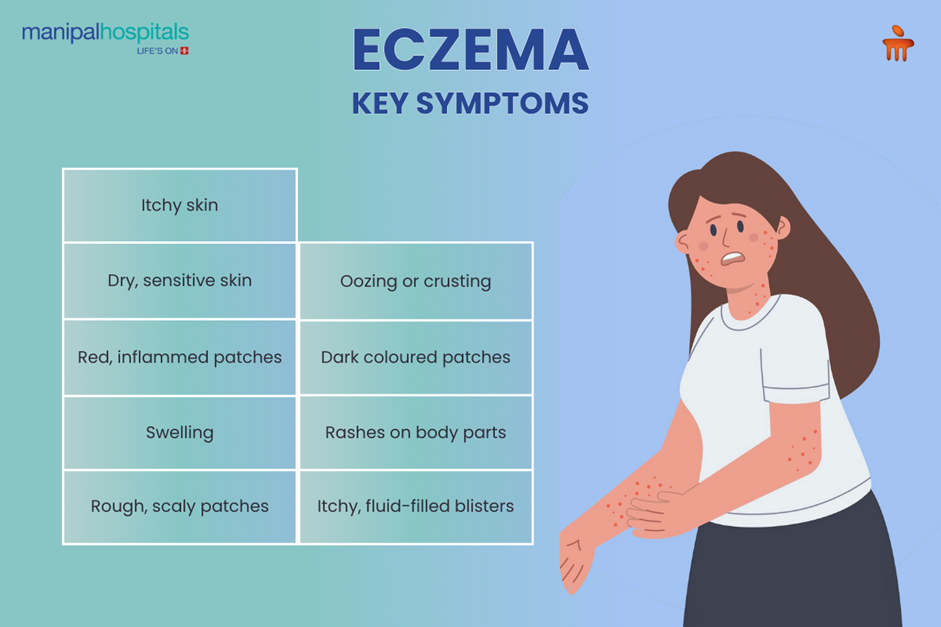
Eczema is a chronic skin condition that causes inflammation, redness, and intense itching. It affects people of all ages, including infants and young children. Though not contagious, it can greatly impact quality of life. In this blog an experienced dermatologist covers the causes, symptoms, types, and effective treatments for eczema.
Synopsis
What Causes Eczema?
Eczema can occur due to genetic and environmental factors. Individuals who either themselves have asthma or hay fever tendenciesor have realtives with eczema are more prone to developing the condition. An excessive immune response to allergens and irritants in the bodies of eczema patients triggers their skin inflammation.
The condition may become active after exposure to soaps, detergents, allergens, weather changes, stress, or sweating. An easily damaged skin barrier that struggles to retain moisture worsens the condition by letting irritants and bacteria inside.
Common Symptoms of Eczema
Eczema symptoms vary by person and age, but common signs include:

-
Each person experiences different levels of eczema symptoms depending on their age group.
-
Some eczemas present with just skin dryness with persistent itching
-
The characteristic signs include skin patches that are red and inflamed. These patches occur most frequently on the hands, neck area, face, and legs.
-
Chronic skin conditions result in skin thickness along with the development of skin cracks.
-
Eczema in infants' usually appears on the cheeks and scalp. In older children and adults, it usually affects folds.
Types of Eczema
Several types of eczema exist, each with specific characteristics:
-
Atopic Dermatitis: The most common type in children, linked to asthma and nasal allergies.
-
Contact Dermatitis: Caused by direct contact with irritants like soaps or chemicals.
-
Dyshidrotic Eczema: Involves small, itchy blisters on hands or feet.
-
Nummular Eczema: Round, coin-shaped spots on the skin, often triggered by dry skin or injury.
-
Seborrheic Dermatitis: Affects oily areas like the scalp and face, often associated with dandruff.
-
Stasis Dermatitis: Occurs on the lower legs due to poor circulation, common in older adults.
How to Manage and Treat Eczema?
Managing eczema involves avoiding triggers, moisturising skin, and reducing inflammation. Regular skin care is essential. To retain skin hydration, use gentle, fragrance-free cleansers and thick moisturisers. Lukewarm showers and pat-drying the skin can help reduce irritation.
Avoid scratching, as it can worsen symptoms and lead to infection. Wearing soft, breathable fabrics like cotton and avoiding wool or synthetic materials also helps. Stress management, through relaxation techniques or exercise, can reduce flare-ups. Identifying personal triggers, such as specific foods or environmental allergens, is crucial for long-term control.
Medications and Treatments
For mild cases, moisturizers and good skincare may be enough. However, moderate to severe eczema often needs medical treatment, and a visit to an experienced dermatologist in Bangalore is recommended.
-
Topical corticosteroids: These are commonly prescribed to reduce inflammation and itching.
-
Non steroid Topical Medication : These are used in chronic eczemas to reduce steroid need
-
Antihistamines: They are mainly taken at night and can relieve itching and improve sleep.
-
Immunosuppressants: These may be prescribed for severe cases when other treatments fail. These help calm the immune response.
-
Light therapy (phototherapy): It involves exposing the skin to controlled UV light under medical supervision. It is useful when topical treatments are ineffective.
When to See a Doctor
You should consult an expert skin doctor in Bangalore if:
-
The rash becomes painful, crusted, or shows signs of infection
-
Symptoms interfering with daily life or sleep
-
You experience frequent flare-ups or large areas of affected skin
-
You develop eczema for the first time as an adult.
A dermatologist can diagnose the condition and suggest an individualised treatment plan. Visit the dermatology department in Bangalore, for expert treatment.
Conclusion
Eczema is a long-term condition that can affect daily comfort and confidence. Although it can’t be cured entirely, managing triggers, following a consistent skincare routine, and using prescribed treatments can provide significant relief. Recognising symptoms early and seeking medical advice when needed is the key to controlling eczema effectively.
FAQ's
No, eczema is not contagious and cannot spread from person to person.
Yes, foods like dairy, nuts, or gluten can trigger flare-ups in some people. It’s best to observe and consult a doctor.
Contact eczemas can go away with allergen avoidance , but other forms of eczema can persist or recur . Proper care helps manage it.
Repeated scratching and severe flare-ups may lead to scarring or skin thickening.
Yes, it often runs in families with a history of allergies, asthma, or hay fever. This is called the Atopic triad.





















 4 Min Read
4 Min Read









